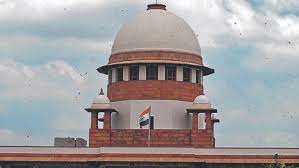1991 were overturned and the land, subject matter of dispute, was stated to be rightfully belonging to the Respondents herein, namely Joseph, by virtue of the principle of adverse possession. (Para 1)
In deciding the present dispute, this Court must examine the same from two angles. One, whether the Judgement impugned, arising out of Second Appeal meets the established criteria for Second Appeal or not?; and two, whether the respondents herein are entitled to the relief of adverse possession or is the claim so made, barred by the Kerala Land Conservancy Act, 1957? (Para 7)
For an appeal to be maintainable under Section 100, Code of Civil Procedure (‘CPC’, for brevity) it must fulfil certain well established requirements. The primary and most important of them all is that the appeal should pose a substantial question of law. (Para 8)
A perusal of the judgement impugned does not reflect any question of law, either substantial or “involving in the case” to have been framed by the Court in the Second Appeal. (Para 9)
In view of the principles laid down in the above stated judgements, the impugned judgement must be faulted with for not complying with the well-established contours of Section 100, CPC. (Para 11)
It is contended by the State that a question of adverse possession does not arise, on two grounds – one, that the land is undisputedly Government land and two, that the respondents had possession of such land only for a period of 15 years which is less than required period of 30 years, after which adverse possession could be claimed against the State. Further, it is submitted that Section 20 of the Act bars any suit or other legal proceedings against the Government in respect of any action taken by it under this Act in respect of unauthorised occupation of land, and, since the notice which initiated the present proceedings under the instant act, the proceedings that it gave rise to, were barred by law. (Para 14)
However, the primary requirement of the civil suit being in connection with an action taken by the Government, remains unmet and therefore, on the basis of the third ground alone, the bar enshrined in this Section cannot be applied to the present case. (Para 19)
In the instant facts, for the respondents to be granted the enjoyment of the disputed property, clear, continuous and hostile possession would have to be established by way of cogent evidence and the animus possidendi must be demonstrated. We now proceed to examine whether these requirements are met with in the present case. (Para 22)
The first part of burden of proof as discussed in Revamma (supra) is undoubtedly met with since the subject land being Government land, was never in dispute. The burden of proof once shifted, it was for the claimants to prove their possession to be openly hostile to the rights of the government. (Para 24)
By way of evidence adduced, nothing, save in except testimonies of villagers, has been brought on record. A perusal of such evidence also shows no decisive statements being made and instead, on the basis of the estimated age of trees on such land, is the length of possession of the respondents being calculated. (Para 25)
On separate analysis, the testimonies upon which the claimants seek to place reliance and which the impugned judgement terms as “unshaken”, while undoubtedly pointing towards the long-term possession of the claimants on the land in question, are not of such a nature to satisfy the requirement of a “more serious and effective” enquiry. (Para 26)
A perusal of the testimonies reveals that consistency is lacking in terms of the age of the rubber trees. Certain witnesses claim the age to be 15 years while others claim the same to be 18 years. (Para 27)
It is a matter of record that proceedings of ejectment of the claimant stood initiated before the concerned Tehsildar in which claimant neither pleaded nor claimed title by way of adverse possession. To the contrary, the unauthorised occupation was not disputed, with the only plea being taken of having planted certain trees (rubber trees), put to use for rubber tapping. (Para 29)
It is also a matter on record that such proceedings stood concluded by the appropriate authority (Tehsildar). By order dated 24th February, 1982 the appropriate authority (Tehsildar) had passed an order directing the claimant to not only vacate the land but also to pay compensation amounting to Rs. 354/-; these facts were never referred to in the plaint. (Para 30)
The Assistant Collector, Idduki, unequivocally stated the reason for non-assignment of land to the claimanst, for the same being set out for a public purpose. Noticeably, the order passed by the Tehsildar or the Assistant Collector was never ever subjected to challenge by the claimants either by resorting to the mechanism provided under the Act nor in the suit, the subject matter of consideration. (Para 31)
On oath, in a specific query put to PW 1 as to whether there is no record to establish suit the property to be in their possession from the year 1940 onwards, there is a categorical denial. Equally the witness denies having any proof of residing in the property, since 1940, adjacent to the property subject matter of the suit. (Para 35)
It is in this view of the matter, we find that the findings returned by the High Court holding the witnesses, more particularly PW1 to PW5 to have established the claimants’ claims by way of adverse possession to be erroneous.
SUPREME COURT OF INDIA
2023 STPL(Web) 156 SC
[2023 INSC 693]
Government Of Kerala & Anr. Vs. Joseph And Others
Civil Appeal 3142 of 2010-Decided on 9-8-2023
https://stpllaw.in/wp-content/uploads/2023/08/2023-STPLWeb-156-SC.pdf







